Open Access is Free, Actually
Guest post by Brandon Butler, the Library’s Director of Information Policy.
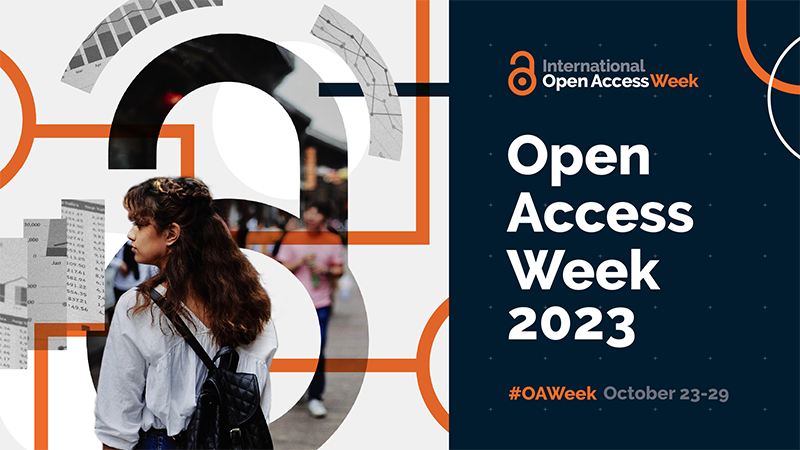
As we celebrate Open Access Week this week, and in particular as we reflect on the theme “Community over Commercialization,” the time is ripe for highlighting the difference between open access as a copyright choice, open access as a compliance step, and open access as a business model for commercial publishers. Seeing the difference between these three things can help us make clear-eyed choices about where and how to invest time, money, and social capital in support of this broad, multifaceted thing we call “open access.”
Open access as a copyright choice
Ordinarily, copyright requires that someone ask permission before sharing, adapting, or otherwise reusing in-copyright works (unless, of course, your use is a fair use). Open access as a copyright choice describes making your work available with an open license so that anyone can share and reuse it without any additional permission (typically subject to some basic conditions, like attribution). Publishers are often seen as the ones in charge of permissions, and the choice to assign an open license often takes place as part of an author’s interaction with a publisher, but there’s nothing in copyright law that requires things to work this way.
Indeed, unless an author transfers their rights (or grants an exclusive license), the power to grant permissions is entirely theirs from the moment a work is created. There are, of course, exceptions to this general rule: institutional policies, privacy concerns, and other issues can constrain author choices. But in general, any research product that could be published by a traditional publisher or posted to a public platform (which would require the author as copyright holder to grant the publisher or platform a license) can also be openly licensed (which is simply the author offering a license to the general public). Choosing and applying an open license involves some thought and a little bit of work, but it’s something that any academic author can manage fairly easily with a little help from an online tutorial. (I’m always happy to help, too, if UVA authors have questions about choosing a license. Just drop me a line.) In other words, open access as a copyright choice is free in both senses of the word: “free as in speech” because authors have the legal right to use open licenses, and “free as in beer” because there is no cost to do so.
Open access as a compliance step
Authors encounter open access as a compliance step when their work is subject to a policy that requires them to make it openly available. A high-profile example of such a policy is the White House Office of Science and Technology Policy’s bold plan to make all published results of federally funded research freely available to the public without delay. A crucial thing to understand about this plan is that funded researchers can comply with it simply by placing a copy of their published work in an agency-designated repository. Such repositories are almost certainly going to be operated by agencies themselves (like the enormously successful PubMedCentral repository hosted by the National Institutes of Health) or by universities (like our own LibraOpen). The same can be said of other policies that might impact researchers, such as university open access policies: compliance generally just requires depositing a copy in an open repository. These repositories are certainly not free for institutions and agencies to operate and support, but they are relatively affordable, and they are completely free to authors to use. So, here again there is no cost to researchers who need open access as a compliance step.
Open access as a business model for commercial publishers
Although these two fundamental elements of open access — assigning an open license and complying with open policies — are generally available to researchers at no cost to them, the mention of open access still leads most researchers to think immediately of paying a fee — often a hefty one. That’s because most researchers encounter open access as a business model for commercial publishers. And since we have seen that there is no cost to assign an open license and no cost to comply with open policies, it’s important to understand what you’re actually paying for when you buy “open access” from a commercial publisher. There are two main answers.
First, and most importantly from an author’s perspective, you’re getting the journal’s imprimatur on your research. Unfortunately, publishing in “high quality journals” is still seen as a sine qua non for career advancement in many fields. For decades the commercial publishers’ oligopoly control of these journals made it possible for them to squeeze eye-popping profit margins from library budgets in the form of extractive subscription fees. Using the “article processing charge” (APC) mechanism, publishers can run the same play against a group with even less bargaining power than libraries: authors. If having a particular journal listed on your CV is the difference between receiving tenure and having to find a new line of work, the price of admission to that journal could get very high, indeed, and authors would still feel compelled to pay. As the academic TikTok/YouTube persona Dr. Glaucomflecken has suggested (jokingly, of course), it’s a model that bears at least a passing resemblance to extortion. In any case, what you get for the money is not open access (remember, that’s free); it’s prestige. And when prestige has a price tag, inequity and predation are never far behind.
Second, and perhaps more generously to the publishers, you get the services that publishers generally describe themselves as providing: organizing peer review, copy editing, marketing and promotion and so on. In a toll access model, subscription fees cover the costs of these services; absent subscriptions, the publishers say, they must make their money from authors. But what is the real cost of publishing an article? Notoriously, peer reviewers are unpaid, as are authors. (Dr. Glaucomflecken has a great bit on this, too.) One study found that the actual cost of publishing a scholarly article likely ranges from $200-$1000 an article, with $400 as the average. Where does the rest of your APC go? Executives at the biggest publishers are paid very well, as are their shareholders, but it’s not clear why any academic author would be interested in subsidizing these payouts rather than hiring more research fellows or buying more equipment, all else equal. And it’s not clear that authors choose a publisher based on (rather than in spite of) the service they receive. Most authors don’t have the time or the market power to shop around. Because of the prestige factor described above, this is not a market where the price of the service is likely to bear much relationship to its cost or its quality. Indeed, the main driver of APC price appears to be market power.
Why we don’t pay individual article processing charges
As interest in open access grows at UVA, the Library has been asked more and more often about whether we have a fund to pay or subsidize individual APC fees as a way of supporting open access. We do not, and I hope understanding what I’ve just laid out about the three kinds of open access helps make clear why. Through copyright consultation and support for our open repository service, we can provide any UVA scholar with free, high-quality open access options. Collective deals (sometimes called “Read and Publish” deals) at least let us negotiate and pay below-retail fees on behalf of all UVA authors, and you can see the deals we have in place currently on our Writing and Publishing resources page. These deals have their risks and detractors, too, however, and we should be clear-eyed about the trade-offs involved in participating. As the open access landscape evolves, the Library will continue to pursue our strategy of supporting sustainable scholarship, including sustainable open access models.
How the Library supports open publishing
This year’s theme for Open Access Week is “Community over Commercialization,” and it’s easy for those of us at the Library to understand the connection between community and the power of the dissemination of knowledge.
Library communities have long sought to facilitate the sharing of knowledge — they lessen financial barriers, seek to understand their audiences, and encourage discovery and innovation. The UVA Library supports quite a few programs to this end, and aims to facilitate open publishing through tools, assistance, and the power of the academic community.
Specifically, the Library provides publishing platforms, specialty consultations and general assistance, and publisher arrangements that aim to ease broad access to academic material. You can read more about each of these below, and as you consider your own work we encourage you to contact us — we’re always happy to help.
Publishing platforms
Peer-reviewed open access press: Aperio
Aperio supports open access publishing of journals, monographs, open textbooks, and other educational resources. Proposals are accepted on a rolling basis and evaluated quarterly. Find out more about publishing with Aperio.
Institutional repository: Libra
Libra provides a stable, discoverable location for scholarship of all kinds. A perfect place for theses and dissertations, datasets, and journal articles, Libra ensures your work is discoverable in Virgo to the UVA community and beyond. Find out more about publishing with Libra.
Platform for open educational resources: Pressbooks
Pressbooks is online software used by authors, publishers, and educational institutions around the world, to create easy-to-access text material. Books hosted in Pressbooks are usable on devices of any kind and accessible from anywhere. Find out more about publishing with Pressbooks.
Copyright reference and consultation
Copyright law relates to scholarly and creative works in a number of ways, whether you’re reusing existing material or considering how best to steward your own work. The Library offers online reference about copyright and its intersection with scholarship, in addition to housing deep expertise from Library staff. Email ul-copyright-team@collab.itc.virginia.edu to request a consultation, or visit Copyright Essentials for Scholarly Work to get started.
Publisher arrangements for open access subsidies
The UVA Library, alongside VIVA (Virginia’s academic library consortium), has negotiated arrangements with a number of publishers to subsidize costs associated with open access publishing. Those relationships currently include the Association of Computing Machinery, Cambridge University Press, Electrochemical Society, International Water Association, Open Library of the Humanities, Rockefeller University Press, Royal Society of Chemistry, and Wiley. To learn more, review details of each arrangement or contact a subject liaison to help identify the best opportunity for your work.
At the heart of the Library
The tools above and more are covered on the Library’s website, and the Library’s offerings continue to evolve as the publishing world changes.
For help getting started, reach out to lib-scholarship@virginia.edu or Ask a Librarian — the power of UVA’s Library community just might get your work exactly where it needs to be.
Five contemporary artists featured in Harlem Renaissance exhibition
The University of Virginia Library’s major new exhibition: “Their World As Big As They Made It: Looking Back at the Harlem Renaissance” is in full swing. Located in the Main Gallery of the Harrison Institute and Small Special Collections Library, the exhibition opened in September to a packed house and has garnered attention for featuring some of “the Harlem Renaissance’s most popular magazines, manuscripts and original dust jackets of major works, and even some of the period’s fashions.”
The exhibition’s title is inspired by the Georgia Douglas Johnson poem, “Your World,” in which she looks back at the creativity of the Harlem Renaissance, acknowledges the hardships of being an emerging artist, and beckons a new generation of Black artists, writers, poets, publishers, and other creatives with the line: “Your world is as big as you make it.”
In that spirit, Library curators put out a call this past summer for contemporary artists to create works that would explore or respond to poems by Harlem Renaissance authors (curators selected nine poems for artists to choose from by writers including Langston Hughes, Claude McKay, Helene Johnson, and of course, Georgia Douglas Johnson). This project, titled “As Big as We Make It!” was sponsored by a grant from the UVA Arts Council.
The selection committee members – Tamika L. Carey, UVA Associate Professor of English; MaKshya Tolbert, a third-year MFA student at UVA; and Maurice Wallace, a professor of English at Rutgers University-New Brunswick – selected five contemporary artists with connections to UVA and Charlottesville to showcase their work in the exhibition. Read more about them below.
Abreale Hopkins, “Above the Heights”
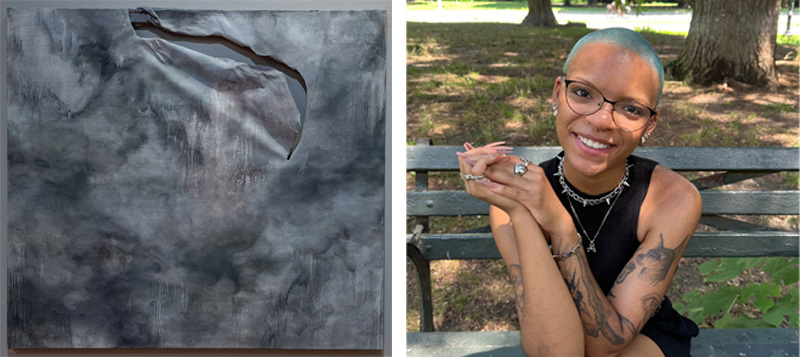
Abreale Hopkins hails from Maryland and now resides in Brooklyn, New York. She received her B.A. from UVA in African American Studies and painting. Hopkins’ work has been shown at the Bridge Progressive Arts Initiative, Ruffin Gallery, and in private collections.
Her painting, “Above the Heights,” is paired with Arna Bontemps’ 1924 poem “Hope.” In her artist statement, Hopkins writes: “Arna Bontemps describes hopelessness as an environment with an all-consuming, daunting energy that weighs heavily on one’s chest. This painting is a display of that purgatory filled by stillness, melancholy, and despair. Shades of grey build upon each other to create a clouded abyss that extends further away as you look. Bontemps reminds us that hope both strikes through our lives with a ferociousness that calls for action, and exists as a quiet idea waiting to catch our attention. … Hope flashes from above, tearing through the seemingly never-ending abyss. The rip running through the canvas is a physical depiction of hopelessness’ impermanence and fragility. The tear’s assertiveness forces your eyes and mind out of the haze, urging you to imagine a different existence.”
Tobiah Mundt, “Of Rivers”
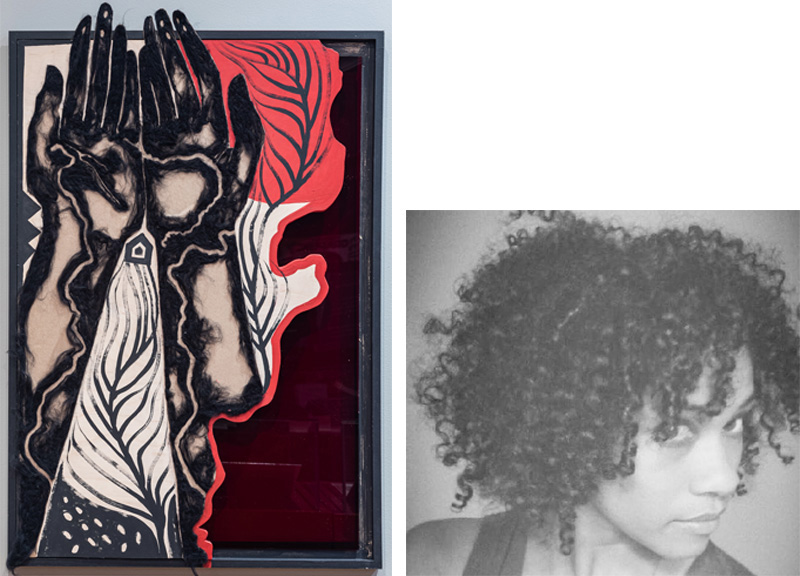
Tobiah Mundt is a self-taught fiber artist from Houston, Texas. She studied architecture at Howard University and eventually left the field of architecture for sculpture. She uses rug tufting, wet felting, and needle felting techniques to sculpt abstract and figurative pieces centered on ancestry and symbolism. A New City Arts Initiative Fellow and former Artist Residence at the Bridge PAI in Charlottesville, her work has been exhibited in Texas, Virginia, Maryland, and Washington, D.C., and is in private and corporate collections locally and nationally.
Mundt’s tufted and needle-felted layered tapestry, “Of Rivers” connects with and responds to the poem, “The Negro Speaks of Rivers” by Langston Hughes. Mundt writes: “The tapestry illustrates African American lineage and connection to the world through the four great rivers mentioned in Hughes’ poem. It further represents the African American’s claim to a future place in the world. … The main image on the tapestry is a black hand and forearm in the style of a linocut. The lines of the Nile, Congo, Euphrates, and Mississippi rivers are drawn with wool from the bottom of the forearm onto the palm and out through the fingertips to the top right of the tapestry. The top right of the tapestry is orange-red to represent a bright African American future. The four corners of the piece tell abstract stories of an African American past, present, and futures.”
Valencia Robin, “Dear Georgia”
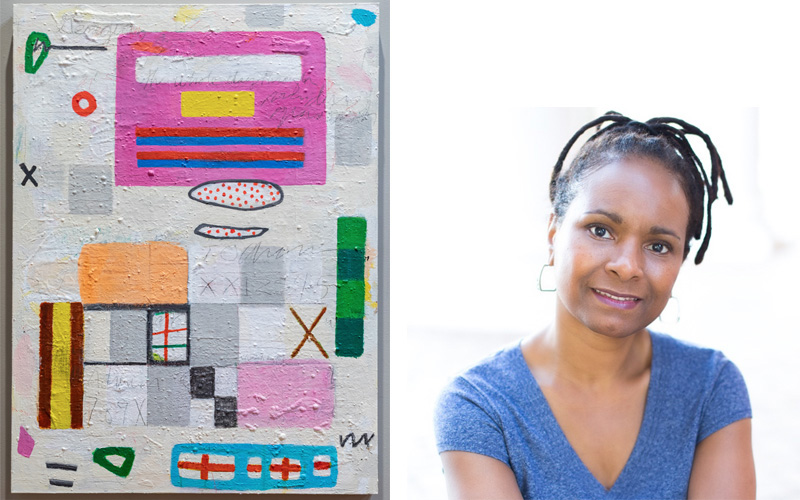
Valencia Robin’s interdisciplinary practice includes poetry, painting, and sculpture. The recipient of a National Endowment for the Arts Fellowship, the Emily Clark Balch Prize, a Margaret Towsley Fellowship, a King-Chavez-Parks Fellowship, as well as fellowships from Cave Canem and the Furious Flower Poetry Center, she holds an M.F.A. in art & design from the University of Michigan and an M.F.A. in creative writing from UVA. Her work has been exhibited nationally and includes a two-person show at Charlottesville’s New City Arts and a solo show at Second Street Gallery. She currently lives and teaches in Johnson City, Tennessee.
Robin’s painting “Dear Georgia” is inspired by Georgia Douglas Johnson’s poem “Calling Dreams.” Robin writes: “My paintings are visual poems, metaphors for capturing my inter- actions with myself and the world. In this sense, I’m both an abstract and representational painter. Like a poem, they reach for the ineffable, try to make it legible.”
Lisa Woolfork, “Three Dark Girls, Loved”
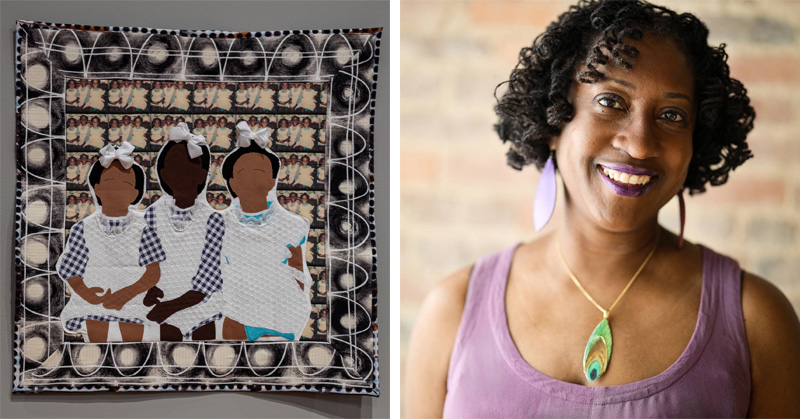
Sewing and quilting are powerful tools for Black resistance, recreation, and rest, as well as storytelling and social justice. As the founder of Black Women Stitch, “the sewing group where Black lives matter,” and the host/producer of Stitch Please, a weekly audio podcast that centers Black women, girls, and femmes in sewing, Lisa Woolfork is committed to using her art practice and social platforms to foster greater understanding, creative expression, liberation, and connection in our communities.
In her artist statement Woolfork writes: “Three abstract figures occupy the center of the design and are superimposed by appliqué on top of a photorealistic fabric foundation of the same image. The quilt border is a textile adaptation in honor of Zora Neale Hurston, as seen in the print’s use of notebook and ledger paper as well as in the bounding white lines arcing over organic circles. This line refers to a sentence from Hurston’s autobiography, where her mother encouraged her to “Jump at the sun.” The piece engages with the first four lines of Gwendolyn Bennett’s poem, “To a Dark Girl.” The quilted scene freezes the girls in a moment prior to awareness of anti-Blackness. It is a moment in time when they were three dark girls, loved. The image is a childhood Polaroid of myself with my sisters wearing dresses made by our grandmother. I am delighted to bring this cherished memory to this exhibit.”
Kemi Layeni, “To Be A Black Girl”
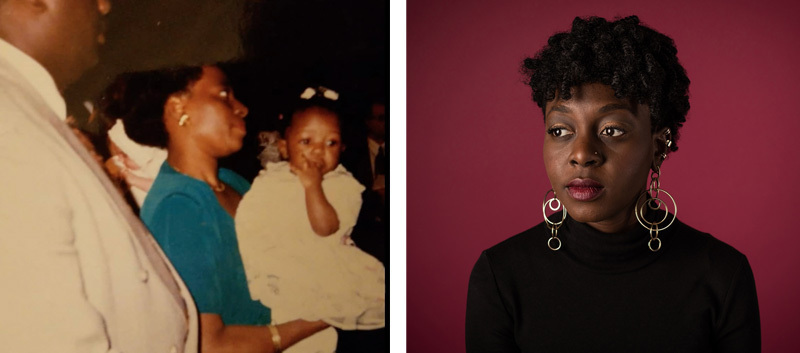
Kemi Layeni is an artist, writer, educator, and M.F.A. Candidate at NYU’s Tisch School of the Arts Graduate Film Program. She works in the mediums of film, photography, and installation art. Her work explores the intersections of history and its burden on the present, Black womanhood, and the experiences of Black people throughout the diaspora. When Kemi is not working on her art, she spends her time working with teenagers in her school and community in performing arts and writing.
Of her multimedia piece, Layeni writes: “In Gwendolyn Bennett’s “To a Dark Girl,” the speaker of the poem’s purpose is to uplift Black girls and women. This piece incorporates voiceover, music, and photos of myself, the artist, from my childhood to adolescence. I chose to start and end with photos of my mother and I to mirror the same relationship of the speaker of the poem and their audience. I chose photos from my adolescence, a time where I was deeply insecure and convinced I was anything but valuable and beautiful, and juxtaposed them with the poem. The piece goes from an imagined mother speaking to a daughter with the words of the poem, to that same daughter speaking to herself, while exploring Black girlhood.”
To see these works in person, visit the main gallery of the Special Collections Library, open weekdays and Saturday afternoons. Or attend our Final Friday event on April 26, 2024, for an open house-style celebration featuring gallery talks by exhibition curators.
Podcasts, books, and films for National Disability Employment Awareness Month
Guest post by Erin Pappas, Librarian for the Humanities; Leigh Rockey, Video Collections Librarian; and Amanda Wyatt Visconti, co-director of the Scholars’ Lab.
Observed each October, National Disability Employment Awareness Month (NDEAM) celebrates the contributions of America’s workers with disabilities past and present and showcases supportive, inclusive employment policies and practices that benefit employers and employees. The U.S. government’s Office of Disability Employment Policy has chosen “Advancing Access and Equity” as the theme for NDEAM 2023. (NDEAM en español.)
Below, check out books, films, podcasts, and other resources we recommend, available through UVA Library or for free on the internet.
First, from Amanda Wyatt Visconti, co-director of the Scholars’ Lab:
 The Job Accommodation Network
The Job Accommodation Network
The Job Accommodation Network’s free filterable collection of ideas for improving job accessibility is really useful in adapting your work or learning environment for what helps you do your work well and in a way that doesn’t hurt your health. I’ve used it to discover things that have helped me personally, found language to effectively ask an employer or teachers to provide an accommodation, and also shared with colleagues as an alternative or addition to the formal HR accommodation process.
 All the Things ADHD podcast
All the Things ADHD podcast
The free All the Things ADHD podcast is helpful and fun, even for folks who aren’t professional women and/or don’t have ADHD — lots of the approaches and tools discussed are broadly useful! This podcast is “a resource for professional women who have been diagnosed later in life with ADHD (like [the hosts]) and the people who love them and are seeking to better understand them. ... The hosts, Lee Skallerup Bessette and Aimée Morrison, both have Ph.D.s, are both considered professionally successful, and yet embraced their diagnoses that came in their 40s. The podcast will address the stereotypes, stigmas, societal pressures, and systemic forces that shape the narrative around ADHD, as well as practical tips and advice for getting along with ADHD.”
Next, from Erin Pappas, Librarian for the Humanities:
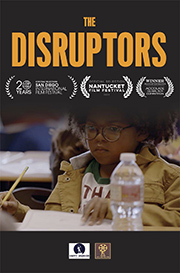 “The Disruptors”
“The Disruptors”
The 2022 film “The Disruptors” takes a closer look at both historical figures who exhibited symptoms associated with ADHD, such as Thomas Edison, Albert Einstein, and Andrew Carnegie, but also with well-known figures from the worlds of entertainment, sports, and business who have ADHD. These individuals include Paris Hilton, Scott Kelly (a former NASA astronaut), Howie Mandel, David Neeleman (founder of JetBlue and Breeze Airways), Michelle Carter (a three-time Olympian), and NFL legend Terry Bradshaw. Through their personal stories, the film illustrates how these real-life role models conquered challenges related to ADHD on their path to remarkable success.
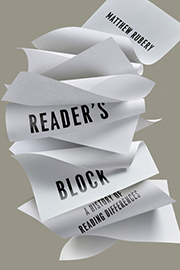 “Reader’s Block: A History of Reading Differences”
“Reader’s Block: A History of Reading Differences”
In “Reader’s Block: A History of Reading Differences,” Matthew Rubery explores the diverse meanings of “reading.” He shares stories of individuals with conditions like dyslexia, hyperlexia, and synesthesia, showing how neurodiversity impacts reading. Rubery challenges our conventional understanding of reading, presenting it as a spectrum of activities rather than a single definition. The book draws on various sources, highlighting how cognitive differences shape reading experiences. You can read it in any way you prefer, just as there’s no one right way to read.
And finally, from Leigh Rockey, Video Collections Librarian:
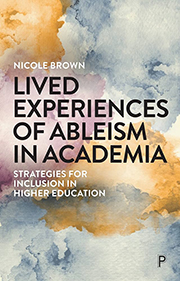 “Lived Experiences of Ableism in Academia: Strategies for Inclusion in Higher Education”
“Lived Experiences of Ableism in Academia: Strategies for Inclusion in Higher Education”
While most of its writers live and work in the United Kingdon, the book “Lived Experiences of Ableism in Academia: Strategies for Inclusion in Higher Education” easily applies to academics of all nations. Institutions of higher learning can be cold, demanding, and unforgiving drivers of achievement. Failure to thrive is often seen as a personal, individual deficiency of talent, intelligence, or stamina — and academia is rarely considerate of people who are not typically able-bodied and able-minded. The engaging (and mostly free of academic jargon) essays in this book depict and then offer ways to solve the problems faced by those in academia who have disabilities, from visual impairment to the autism spectrum to dyslexia to depression. Ultimately, disabled, ill, and/or neurodivergent students, faculty, and staff embody the real narrative of accomplishment and excellence to which all of higher education aspires.
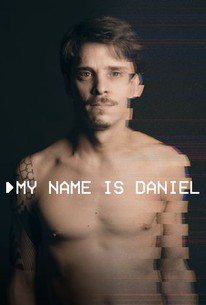 “My Name is Daniel”
“My Name is Daniel”
Through home movies and personal revelations, the Brazilian filmmaker Daniel Goncalves invites us into his life and his disability in “My Name Is Daniel.” The film revolves around diagnosing Goncalves while depicting his home, family, youthful longings, and present-day situation. Goncalves lets scenes play out so the viewer can appreciate the patience and persistence required to live with his as-yet-unlabeled physical differences. Watching him make eggs using his match-lit stove becomes uncomfortable until Goncalves himself makes us laugh with one word. Even with his difficulties on display, he is exactly like everybody (disabled or otherwise) watching him. As a working filmmaker, he turns his life into art, and the viewer appreciates this gift.
October 11 is National Coming Out Day!
National Coming Out Day began in 1988 and is celebrated on the anniversary of the National March on Washington for Lesbian and Gay Rights. It was created as a proactively positive holiday to embrace the LGBTQ+ community and boost its visibility in our day-to-day life. National Coming Out Day is also celebrated in the United Kingdom and a number of other countries.
At the University of Virginia Library, we’re so proud to have members of the LGBTQ+ community as patrons, staff, visitors, researchers, faculty, students, and more. Working to create welcoming spaces for all people is a deeply ingrained value at the UVA Library, and we appreciate all of those who help us move toward that vision.
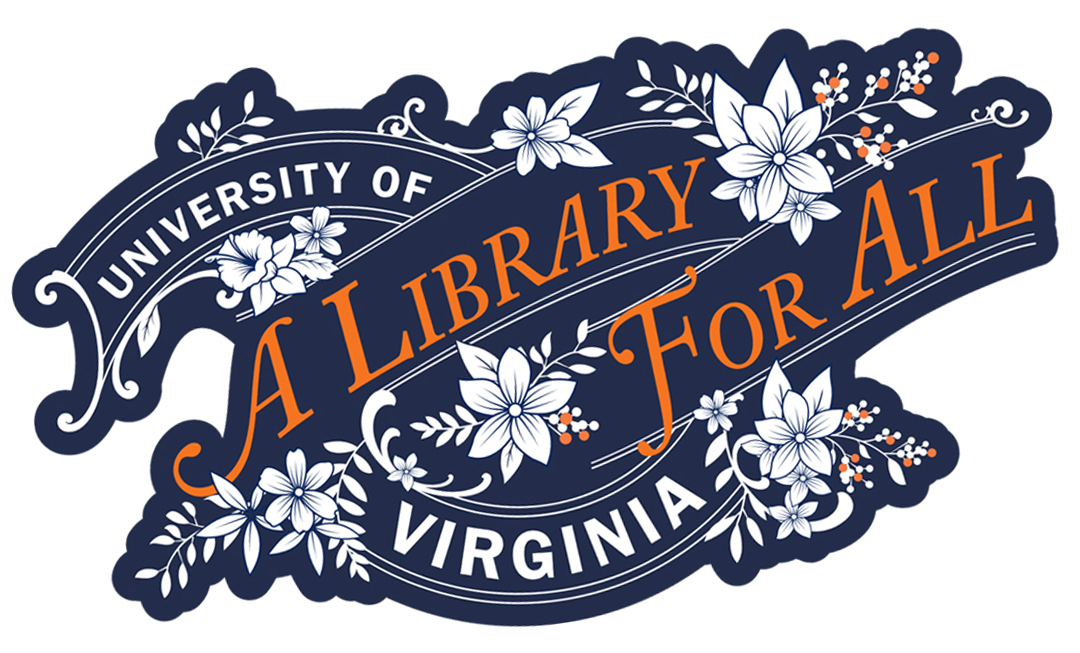 Below are some LGBTQ+ resources you can find in the Library’s collections to deepen your knowledge, your understanding, and your research.
Below are some LGBTQ+ resources you can find in the Library’s collections to deepen your knowledge, your understanding, and your research.
- Archives of Sexuality and Gender: A collection of primary sources documenting how views of sex, sexuality, and gender have changed from the 16th century to the present. The archive’s oral history transcripts, diaries, and letters provide a deeply personal and human interpretation of the LGBTQ experience.
- LGBTQ+ Source: Scholarly and popular LGBTQ+ publications in full text, plus historically important primary sources, including monographs, magazines, and newspapers. It also includes a specialized thesaurus containing thousands of terms. Search LGBTQ+ Source here.
- Queer Pasts: A collection of primary source exhibits for students and scholars of queer history and culture. The database uses “queer” in its broadest and most inclusive sense, to embrace topics that are gay, lesbian, bisexual, and transgender and to include work on sexual and gender formations that are queer but not necessarily LGBTQ.
- Celebrate Pride all year round with recommended books, podcasts, and movies from UVA librarians: 2021, 2022, and 2023.
Whether you’re navigating your own coming-out journey, or wanting to support others, here are some external resources to learn more and find a helping hand.
From UVA’s LGBTQ Center:
“Coming out can be a complex and challenging process — the LGBTQ Center and our on-Grounds partners are here to support you. There is no one right way to come out. It’s a lifelong process of being ever-more open and true with yourself and others — done in your own way and in your own time.”
Learn more about resources and communities at UVA’s LGBTQ Center.
From the Human Rights Campaign:
“Sharing our authentic selves with others is not always safe or easy, and it is not a one-day event — but when possible, it can be an extraordinarily powerful key to breaking down the barriers we face as LGBTQ+ people.”
Learn more from Human Rights Campaign.
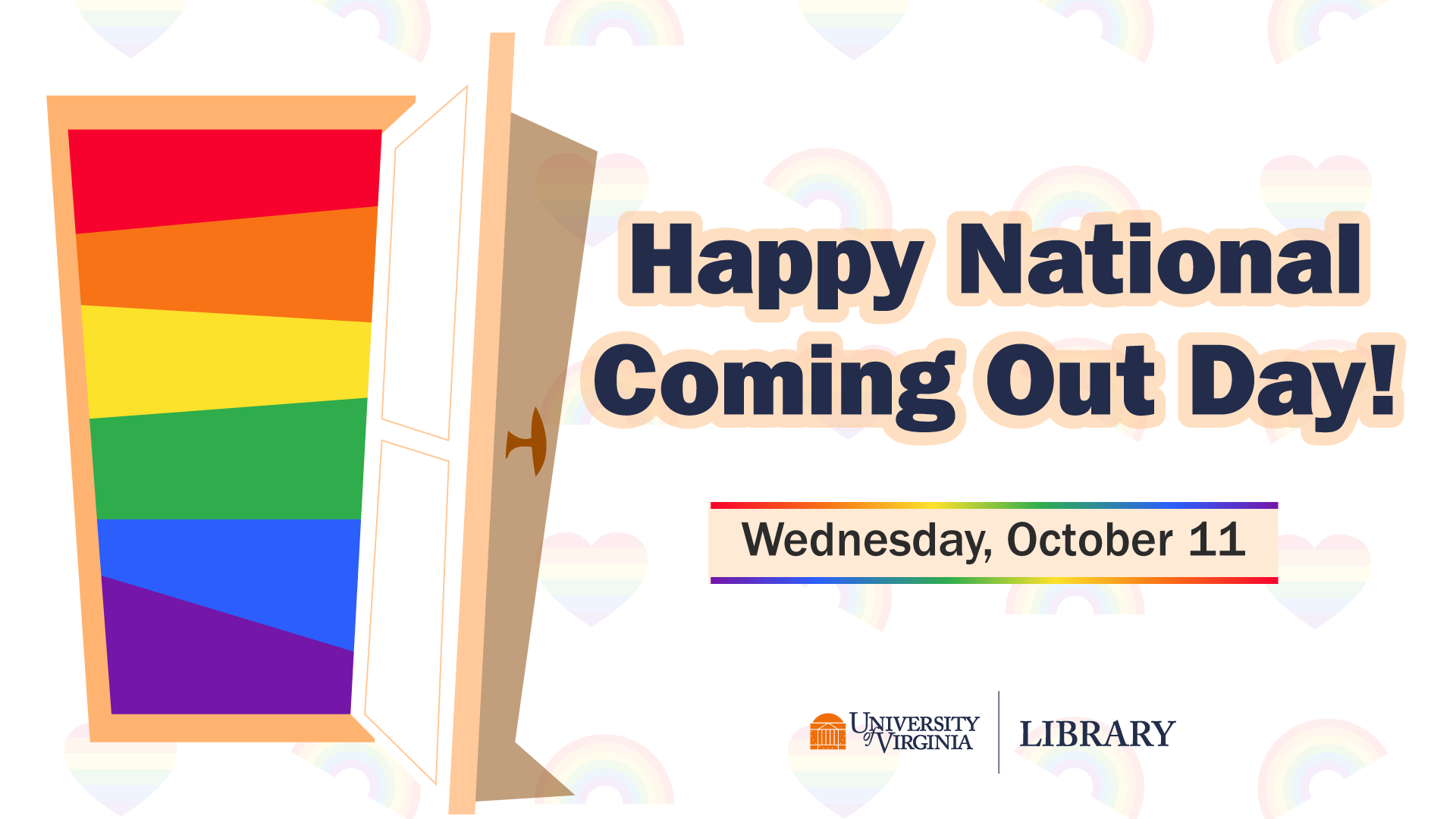
From Dracula to Steampunk: 5 unique events at UVA Library
Sure, you can visit the University of Virginia Library to borrow books (we have more than 5 million of them!), to find a cozy study space, or even to use a 3-D printer, but did you know we offer events ranging from workshops to gallery talks for UVA and the Charlottesville community throughout the year?
Below, check out five upcoming events for those who love art, crafting, cosplay, and Halloween. All Library events are free.
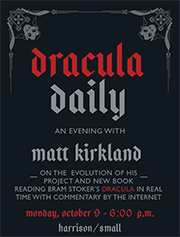 1. Dracula Daily: An evening with author Matt Kirkland
1. Dracula Daily: An evening with author Matt Kirkland
On Monday, October 9, the UVA Library will host Matt Kirkland, author of “Dracula Daily,” in the Harrison/Small Auditorium. Kirkland will sign copies of his new publication (books will be available for sale) and talk about the creation and evolution of the “Dracula Daily” project, which started out as a wildly popular email newsletter. Visitors will have the opportunity to interact with Kirkland and explore the history of Dracula in print. Refreshments will be served, jack-o’-lanterns will be on display, and vampire-themed costumes are encouraged.
- When: Monday, Oct. 9; 6 – 7:30 p.m. (Doors open at 5:30 p.m.)
- Where: Harrison/Small Auditorium
- Registration is required: Register on Eventbrite here.
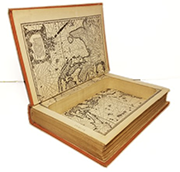 2. Make a Book Safe Workshop
2. Make a Book Safe Workshop
Bring an old book to hollow out and turn into a safe place to store your valuables! A limited number of books will be available; all other tools will be provided. No experience is needed. It only takes an hour to make a safe, so you won’t need to stay for the whole workshop time. Registration is required.
- When: Wednesday, October 18; 11 a.m. – 4 p.m.
- Where: Scholars’ Lab TinkerTank (Clemons, third Floor)
- Registration is required: View “Make a Book Safe Workshop” on the Library calendar
 3. Halloween Maker Craft Workshops
3. Halloween Maker Craft Workshops
The Scholars’ Lab TinkerTank is offering workshops during the week before Halloween (and on Halloween Day) to drop in and create a light-up craft. Participants can also use our button makers, sewing machines, CNC paper cutter, and electronics to make Halloween costumes, decorations, and decor. All supplies are included, all for free!
- When: Oct. 24-27, Oct. 29-31; 11 a.m. – 6 p.m. each day
- Where: Scholars’ Lab TinkerTank (Clemons, third Floor)
- Registration is required; individual workshop calendar listings below.
10/24, 10/25, 10/26, 10/27, 10/29, 10/30, 10/31
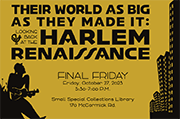 4. Final Friday — Their World As Big As They Made It
4. Final Friday — Their World As Big As They Made It
Join us for a Final Friday celebration of our new exhibitions, including “Their World As Big As They Made It: Looking Back at the Harlem Renaissance,” which features the visionary works of writers, artists, and thinkers whose creative and intellectual pursuits reflected the diversity of discourses that defined Black American identity and political consciousness in the early 20th century.
Five artists with connections to UVA and Charlottesville have works on display as part of our “As Big As You Make It!” project (supported by a grant from the UVA Arts Council), connecting artists working today to Harlem Renaissance poetry from a century ago.
This is a free event and an open house-style celebration. Gallery talks are slated for the following times:
6:15 - Main Gallery - Their World As Big As They Made It with curators Krystal Appiah and George Riser
6:30 - First Floor Gallery - Out of the Box, On the Wall: Russell Smith’s University of Virginia from the Toll Gate with curator Garth Anderson
6:45 - First Floor Gallery - Portrait of a Poet—Revisited: William Edward West’s Percy Bysshe Shelley with curator Annyston Pennington
- When: Friday, October 27, 2023; 5:30 – 7 p.m.
- Where: Albert and Shirley Small Special Collections Library
- Calendar Link – Final Friday
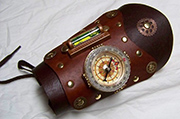 5. Steampunk Cosplay Workshop
5. Steampunk Cosplay Workshop
Do you have a great Steampunk cosplay or Halloween costume in mind? Need some motivation and materials? Come to the TinkerTank Makerspace for an in-person workshop to make a leather and brass light-up wrist cuff, or use the materials to make your own costume accessory! All materials are provided. This is an open workshop; feel free to come and go whenever you can.
- When: Wednesday, October 25; 12 – 4 p.m.
- Where: Scholars’ Lab TinkerTank (Clemons, third Floor)
- Registration is required: View “Steampunk Cosplay Workshop” on the Library calendar
For more events, check out the UVA Library Calendar.
New exhibition looks at UVA through a ‘picturesque’ lens
In June 1844, landscape painter Russell Smith traveled from Philadelphia to Virginia on a hot, dusty train to meet up with geologist William Barton Rogers, a professor of natural philosophy at the University of Virginia. Smith joined Rogers to work as an illustrator for the next phase of the Geological Survey of Virginia, which studied and mapped the commonwealth’s mineral resources. What emerged from that friendship is the subject of a new exhibition now open in the First Floor Gallery of UVA’s Albert and Shirley Small Special Collections Library.

“Out of the Drawer & On the Wall: Russell Smith’s University of Virginia From the Toll Gate” sheds new light on a painting by Smith that captures the Academical Village from a unique vantage point. Garth Anderson, a Facilities Historian in UVA Facilities Management’s Geospatial Engineering Services, curated the exhibition. Anderson said he found out about Russell Smith’s “University of Virginia From the Toll Gate” painting, long held but rarely seen in the Library’s collections, on a tip from Stephen Thompson, then a principal investigator at Rivanna Archaeology.
“I wasn’t too sure what the work was going to be — whether it was a photograph of a painting or what,” Anderson said. “And lo and behold, it was the real painting, and it was something totally different, something that if it had been out and around, would have been noted before.”
Smith’s painting captures the natural beauty of the Blue Ridge Mountains, with a toll gate and rustic house in the foreground. Far off in the hazy distance, just beneath the mountains, the dome of the Rotunda is in view. “I took some photographs of [the painting] and showed it to a few people, but nobody recognized that view,” Anderson said. “It was looking at the University in a new way.”
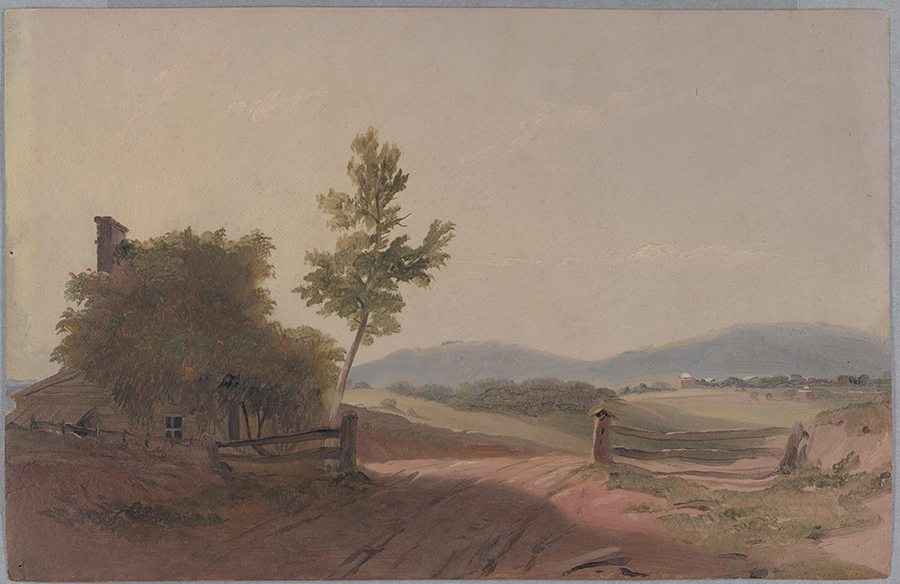
The University as ‘pure landscape’
Smith, a Scottish-born painter who immigrated to Pennsylvania at a young age, made the acquaintance of artists like Rembrandt Peale and John Sartain in Philadelphia. He devoted much of his time to landscape painting in the picturesque style — “an aesthetic ideal that, in the words of influential travel writer and artist Reverend William Gilpin, highlighted ‘that peculiar kind of beauty which is agreeable in a picture,’” according to the exhibition text.
To support his travels to paint landscapes, Smith worked as an illustrator for a state-funded geological expedition in Pennsylvania. (He also traveled to New Hampshire to paint the White Mountains; a current exhibit at the Fralin Musuem of Art examines similar idyllic landscapes from this time.) Through this type of work, Smith eventually met UVA’s geologist William Barton Rogers and joined him in June 1844 to illustrate aspects of the Geological Survey of Virginia.
Smith made notes of his trip to Virginia in a brown leather-bound journal, which is held in the archives of the Smithsonian Institution. Anderson “made a pilgrimage” there, researching and documenting the journal entries to capture a clear picture of Smith’s travels in Charlottesville. Many of those entries are highlighted in the exhibition and show that inspiration for his toll gate painting came on Smith’s first walk with Rogers to a site on the Rockfish Gap Turnpike overlooking the Blue Ridge Mountains:
Shortly after arriving at the University Mr. Rogers took me out a few miles west. The sun was setting and I was forcibly struck with superior picturesque beauty of the Blue Ridge to any of the Penna. Mountains. Its elevation also appears greater and the jutting spurs that run out to the east with the gently scooped valley give it a most charming effect.
Smith returned to the site [which today is the Old Ivy Road entrance to the Miller Center] to determine the best time of day to compose a sketch. On July 4, he wrote:
Walked out two miles after breakfast to the West. Made those sketches and retouched them before dinner. I find the grey cards do not answer so well for colour as for light shading with the pencil being afterwards set with water and a few lights put on.
The subject of one of these sketches — a toll gate is fine for light and shade. The small house is covered entirely with a trumpet vine very dark and opposing the light which is behind.
For the exhibition, Anderson tracked down Smith’s original sketch of the toll gate, which is held at the Library of Virginia. Comparing the sketch to the final painting, Anderson spotted differences in the works. As he wrote in the exhibition copy, “At first glance, Smith’s initial sketch and final painting are very similar. However, upon closer review, you notice differences in the sizes of the Rotunda, Monticello, and Montalto relative to the tollhouse in the foreground as well as the addition of a vast swath of greenspace.” These differences, he said, show Smith’s ability to “compose and manipulate the natural landscapes he observed into picturesque forms.”
Anderson, who has worked for UVA for 39 years, has an academic background in biomedical science, but has spent much of his career creating a database for all UVA-related architectural and engineering drawings held by Facilities Management. He digitized the collection, and researched the architects who began a major expansion of the Academical Village, starting with McKim, Mead, & White, as well as who approved those plans, leading to extensive work in Special Collections. He contributed research to Richard Guy Wilson and Sara Butler’s “The Campus Guide: University of Virginia,” a seminal guide to the history and architecture of UVA, as well as to a major 2010 Library exhibition “From Village to Grounds: Architecture After Jefferson at the University of Virginia,” part of the UVA’s celebration of the centennial of Carr’s Hill.
As for “Out of the Drawer & On the Wall,” Anderson hopes viewers will come away with a new, somewhat idealized view of UVA, one that is vastly different from the tidy Lawn. “The University can look beautiful in the landscape,” he said. “To me, that’s the really the charm of it; it’s such a pure landscape. I love that.”
“Out of the Drawer & On the Wall: Russell Smith’s University of Virginia From the Toll Gate” is on view through Nov. 5, 2023 in the First Floor Gallery of the Harrison Institute and Small Special Collections Library.
Four facts about the main library, reopening in January
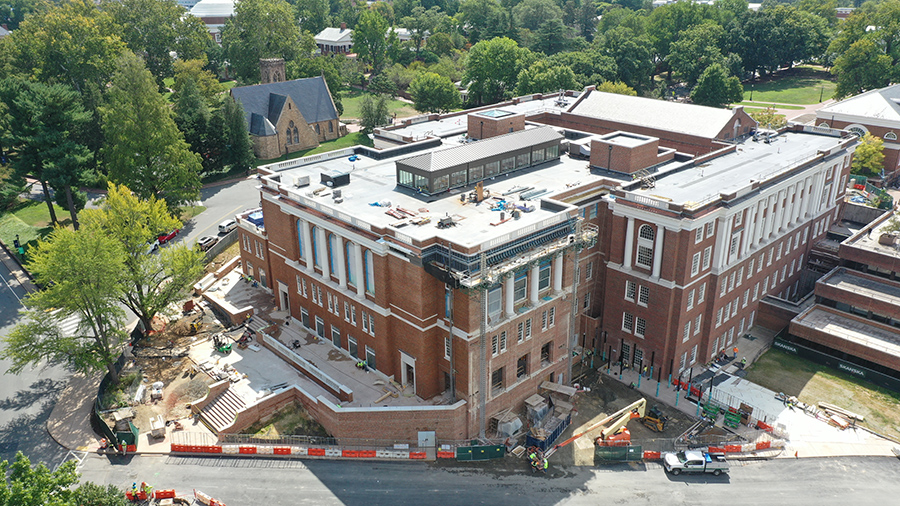
The University of Virginia Library is pleased to announce that its main library renovation project that began in early 2020 is set to be completed by the end of the fall 2023 semester. The renovation will bring the building up to current standards of safety, accessibility, and service and result in beautiful, naturally lit study and research spaces.
Read on for four facts about the reopening.
1. The main library opens to the public on Jan. 8, 2024.
The building will not be open to visitors before then, but we’ll be excited to kick off the spring semester in January.
2. A grand opening celebration will be held in the main library on April 4, 2024.
Details about the event are forthcoming.
3. Books will be moved back into the main library starting in December 2023.
This process, which starts at Clemons Library and Ivy Stacks, where the books are currently shelved, involves more than a dozen Library staff members and more than a million printed books. The full book move will take about six months.
4. The renovated library will feature modern amenities suited to the needs of its users.
Benefits of renovation include:
- An updated and expanded south entrance, a new highly accessible north entrance, and a new easy connector between Clemons and main on the second floor.
- A new café near the north entrance that will provide refreshments and additional space for the University community to gather.
- Better use of space to improve wayfinding and offer a variety of environments for study, research, and social interaction.
- Better facilities for the ongoing conservation and preservation of the print collections.
For more about the main library, check out our new video tour of the renovation in progress with Kit Meyer of UVA Facilities Management.
Dig into the work of these five writers for Hispanic Heritage Month
Guest post by Amy Hunsaker, Music & Performing Arts Librarian
It’s time to celebrate Latinx authors during Hispanic Heritage Month, which overlaps September and the first few weeks of October. Don’t know where to start? This year, we’ve gathered a list of five Latinx authors whose works we recommend reading. Take a look below.
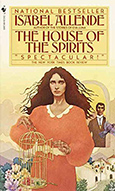 Isabel Allende’s contributions to Latinx literature are substantial, encompassing her innovative writing style, feminist perspective, advocacy, and cultural bridging. Her work has left an indelible mark on the literary landscape, making her a significant figure in the world of Latinx literature. Some of her more notable works include “The House of the Spirits” (“La Casa de los Espíritus”), “Eva Luna,” and “Daughter of Fortune” (“Hija de la fortuna”).
Isabel Allende’s contributions to Latinx literature are substantial, encompassing her innovative writing style, feminist perspective, advocacy, and cultural bridging. Her work has left an indelible mark on the literary landscape, making her a significant figure in the world of Latinx literature. Some of her more notable works include “The House of the Spirits” (“La Casa de los Espíritus”), “Eva Luna,” and “Daughter of Fortune” (“Hija de la fortuna”).- Julia Alvarez is a highly influential Dominican American writer known for her powerful storytelling and exploration of themes related to identity and immigration. Her writing fosters cross-cultural understanding, bridging the gap between the Dominican Republic and the United States and facilitating dialogue on issues of identity and belonging. To get a good understanding of her writing, try reading “How the García Girls Lost Their Accents” and “In the Time of the Butterflies.”
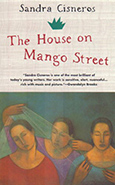 Sandra Cisneros played a crucial role in shaping and popularizing Chicana literature, which explores the experiences of Mexican American and Chicano communities in the United States. Cisneros’ novel “The House on Mango Street” is a seminal work in Latinx literature. It provides a poignant and relatable portrayal of growing up in a marginalized urban environment, and it has become a staple in classrooms and literary discussions.
Sandra Cisneros played a crucial role in shaping and popularizing Chicana literature, which explores the experiences of Mexican American and Chicano communities in the United States. Cisneros’ novel “The House on Mango Street” is a seminal work in Latinx literature. It provides a poignant and relatable portrayal of growing up in a marginalized urban environment, and it has become a staple in classrooms and literary discussions.- Carlos Fuentes was a central figure in the Latin American literary boom of the 1960s and 1970s whose works helped shape and define modern Latin American literature. Fuentes’ writing often delves into political and social issues, offering incisive critiques of power dynamics, politics, and social injustices both in Mexico and globally. Many of his novels, such as “The Death of Artemio Cruz” and “Terra Nostra,” grapple with the complexities of Mexican identity and history, shedding light on the cultural nuances of the nation.
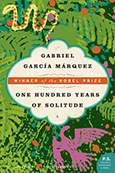 Colombian novelist and Nobel laureate Gabriel García Márquez is credited with popularizing and defining the genre of magical realism in literature. This style combines the ordinary with the extraordinary, blurring the lines between reality and fantasy. His novel “One Hundred Years of Solitude” is a quintessential example of this genre. Many of García Márquez’s works explore themes of politics, power, and social injustice. He was an astute observer of Latin American political history, and his writings often served as a commentary on the socio-political realities of the region. His works have been translated into numerous languages and have been read and celebrated worldwide. This global reach helped bring attention to Latin American literature and culture on a global scale in the 20th century.
Colombian novelist and Nobel laureate Gabriel García Márquez is credited with popularizing and defining the genre of magical realism in literature. This style combines the ordinary with the extraordinary, blurring the lines between reality and fantasy. His novel “One Hundred Years of Solitude” is a quintessential example of this genre. Many of García Márquez’s works explore themes of politics, power, and social injustice. He was an astute observer of Latin American political history, and his writings often served as a commentary on the socio-political realities of the region. His works have been translated into numerous languages and have been read and celebrated worldwide. This global reach helped bring attention to Latin American literature and culture on a global scale in the 20th century.
In addition …
The Library provides a Spanish Language & Literature guide to direct you to the best resources for the study of Spanish language and literature at UVA, as well as a Latin American & Iberian Studies research guide that includes collections about Latin America, Caribbean, Portugal, and Spain.
And don’t miss our newest Spanish-language databases available for free to UVA students, faculty, and staff:
- Platino Educa is a Spanish-language film streaming platform with over 300 films from Spain and Latin America. The films are classified by subject and cover a broad range of themes, including art, history, environmental science, literature, and social justice. The films were specifically selected for teaching and some come paired with preselected scene clips and educational guides. Films have Spanish and English subtitles.
- Latinx Thought and Culture: The NPR Archive, 1979-1990 showcases two radio programs: the weekly Spanish-language Enfoque Nacional (1979-1988) and the daily English-language Latin File (1988-1990), available for the first time in a searchable database as digitized audio with transcripts. They focus on Latinx issues related to politics, sociology, human rights, the arts and more with interviews of key figures and news reporting by a new generation of Latinx journalists at the time.
- Hispanic Life in America: Series 3 is a news media resources database sourced from more than 17,000 American and global news sources, including over 700 Spanish-language or bilingual publications. It covers arts and entertainment, civil rights and activism, immigration and citizenship, sports and athletes, labor, religion, science and technology, and society and culture.
Will the real Percy Shelley please stand up?
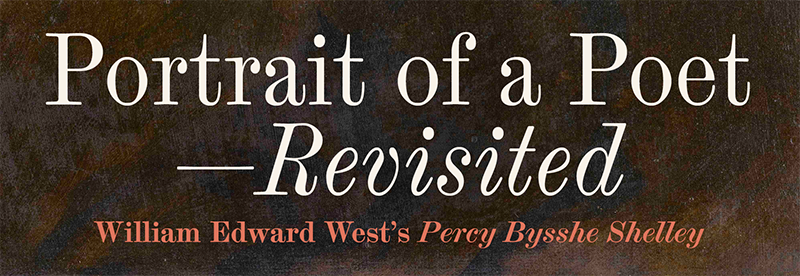
A new exhibition now open in the First Floor Gallery of UVA’s Harrison Institute and Small Special Collections Library makes a bold and compelling claim: a portrait long held in the Library’s collections has for nearly a century been misidentified and is now believed to be the most accurate image of the poet Percy Bysshe Shelley in existence. Arranged to appear almost like an evidence board on a detective show, the exhibition calls on the viewer to look with their own eyes, asking, “What do you see?”
Shelley, who is now regarded as one of the most influential English poets of the Romantic movement, was not well known in his lifetime. The author of the utopian allegory “Queen Mab” and the sonnet “Ozymandias” (a poem so endurably influential it was referenced in the television shows “Succession” and “Breaking Bad”), Shelley lived a radical life. He was an atheist and a vegetarian who promoted sexual freedom and an end to aristocratic privilege. Due to backlash against his beliefs, Shelley self-exiled in Italy, where he drowned in 1822 at the age of 29.
Few portraits of Shelley were ever made in his lifetime; an 1819 portrait of the poet by amateur Irish painter Amelia Curran is the best known and was copied by several artists. UVA Library’s new exhibition “Portrait of a Poet—Revisited: William Edward West’s Percy Bysshe Shelley” makes the claim that a portrait by American painter William Edward West was for years misidentified as an image of the English writer Leigh Hunt and is actually a portrait of Shelley, based on a sketch composed just days before Shelley’s death.
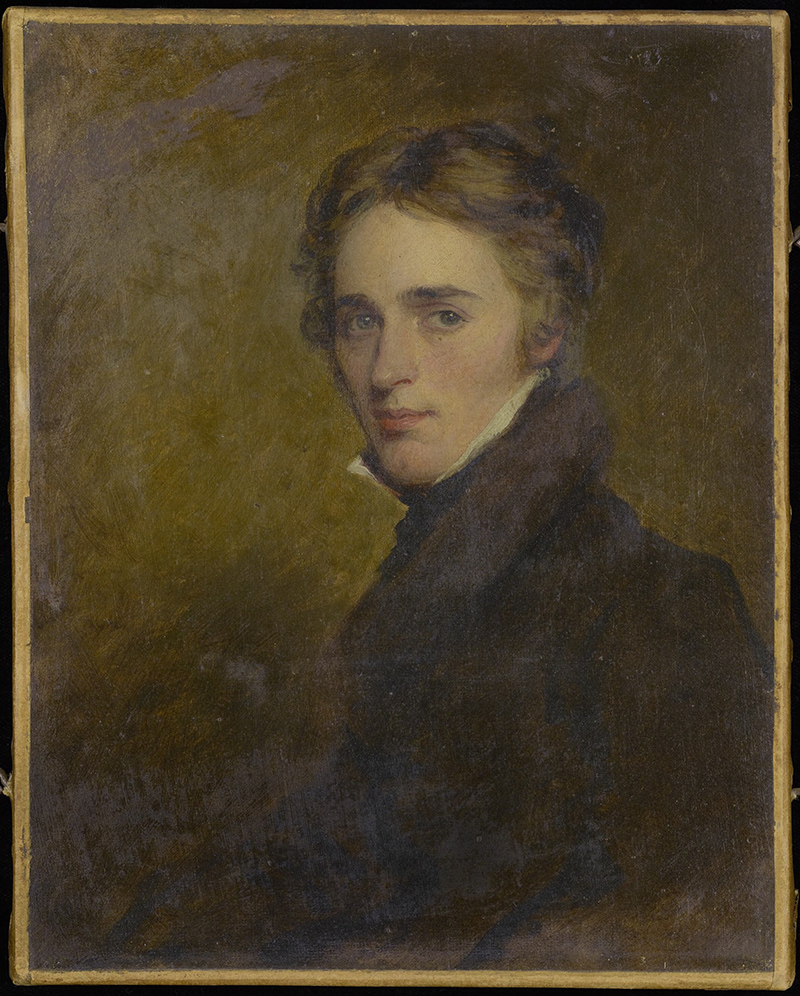
“It’s an amazing thing to have this portrait, arguably the best painting we have of Shelley and the only one done by a professional portraitist, here at UVA,” said Andrew Stauffer, a UVA professor of English and co-curator of the exhibition. “We’ve relied on the Curran portrait to characterize Shelley in the past and he’s come off as rather angelic and somewhat infantilized in certain ways,” he said. “This picture shows him as political, interested, older — he’s got the gray hair in his sideburns; it’s captured right before his death. It’s a way of seeing Shelley that we haven’t had access to.”
The story behind the portrait
About a year ago, Stauffer, who specializes in literary Romanticism, was at work on a forthcoming biography of the poet Lord Byron. Deep in research mode, Stauffer was examining an 1822 portrait of Byron done by William Edward West when he came upon another West portrait that gave him pause. The man in this second portrait, in Stauffer’s eyes, very much resembled Percy Bysshe Shelley, who was a peer of Byron’s. Stauffer began delving into that portrait’s history and current location and discovered it was held just “100 yards away” from where he was working: in UVA’s Special Collections Library.
The portrait first appeared in 1905, when it was published, along with a narrative of its provenance written by Nellie P. Dunn, in The Century magazine. Dunn, who ultimately donated the portrait to UVA Library, wrote that, according to West’s nephew, West met Shelley in the summer of 1822 at Byron’s summer house in Montenero, Italy, and was “so impressed by the man’s charming individuality” that he “slyly made a sketch of him.” This was less than a week before Shelley drowned in a shipwreck in the Tyrrhenian Sea. At some point after Shelley’s death, according to the narrative, West made the oil painting from his “sly sketch.”
The portrait was accepted as Shelley for much of the early 20th century. But in 1940 the scholar Newman Ivey White published an influential biography of Shelley in which White objected to the authenticity of the West portrait, insisting it was instead a portrait of Leigh Hunt, another peer of Byron’s. White suggested that West invented his story opportunistically, once Shelley’s fame had risen in the mid-19th century. “I believe White got it wrong with regard to West,” Stauffer writes in a forthcoming article in the Keats-Shelley Journal. “In my view, it is the best portrait of Percy Shelley that has come down to us, and 20th-century Shelleyans were right to accept it as genuine.”
The exhibition systematically dismantles White’s theory by examining physical evidence in a way that White wasn’t able to in his time. “It uses technology that wasn’t available in the 1940s when White made his argument,” Stauffer said. “He was working with low-quality black and white photos, all reproduced in old books. Whereas we can put various portraits side by side, magnify them, and zoom in.” The visual resemblance to all other existing Shelley portraits is crucial, Stauffer said, as well as a short 1828 magazine article on Shelley that stated West had indeed met the poet in Italy and claimed that Shelley “had also the most wonderful-looking head ever seen alive on our earth.”
“Shelley was not famous when that article was published,” Stauffer said. “There was no reason West would make that up for self-aggrandizement. To me, this is the smoking gun that suggests he definitely met Shelly, observed him physically, and likely sketched him, which is what artists tend to do.” In the face of testimony reported from the painter himself, Stauffer writes in his forthcoming article, “the burden of proof falls on White.”
Stauffer and Annyston Pennington, a UVA English doctoral student who co-curated the exhibition, acknowledge that their evidence is circumstantial, but feel they have built the strongest case possible. “We’re just raising the conversation letting people decide for themselves,” Stauffer said. “The Library has been so supportive through this whole experience,” both in terms of conserving the portrait and updating it in the catalog to acknowledge the new scholarship, he said.
In that sense, the exhibition reminds the viewer that the Library’s archives are not static repositories, but instead living collections where curators, professors, and researchers are reinterpreting objects. “This exhibition blends visual art, art history and literary history,” said Pennington, who translated Stauffer’s article into the exhibition structure with visual aids and additional images.
“It shows off the work that’s often happening behind the scenes at the Library — of revisiting and reevaluating the collections,” Pennington said. “That reframing makes them valuable in an ongoing way.”
“Portrait of a Poet—Revisited: William Edward West’s Percy Bysshe Shelley” is on view through Nov. 5, 2023 in the First Floor Gallery of the Harrison Institute and Small Special Collections Library.
Browse by category
Browse by date
- November 2018 (1)
- August 2019 (1)
- November 2019 (1)
- January 2020 (1)
- November 2020 (1)
- January 2021 (1)
- September 2021 (2)
- October 2021 (1)
- November 2021 (1)
- January 2022 (4)
- February 2022 (2)
- March 2022 (2)
- April 2022 (1)
- May 2022 (3)
- August 2022 (1)
- September 2022 (2)
- November 2022 (4)
- December 2022 (3)
- January 2023 (6)
- February 2023 (9)
- March 2023 (11)
- April 2023 (6)
- May 2023 (4)
- June 2023 (3)
- July 2023 (1)
- August 2023 (3)
- September 2023 (5)
- October 2023 (7)
- November 2023 (3)
- December 2023 (5)
- January 2024 (4)
- February 2024 (8)
- March 2024 (2)
- April 2024 (6)
- May 2024 (4)
- June 2024 (1)
- July 2024 (2)
